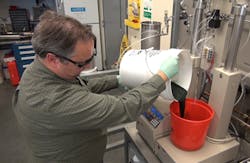US scientists develop quick method to convert algae into crude
Scientists from the Department of Energy's Pacific Northwest National Laboratory (PNNL) in the state of Washington have developed a method to produce crude from algae. The chemical process takes less than an hour and is relatively cheap, the PNNL announced.
If the process can be scaled up to become commercially available, it could prove to be a sustainable solution to the algae bloom problem that affects numerous water bodies across the United States. Currently, the process is being tested in a pilot plant operated by Utah-based biofuels company Genifuel Corp., which has licensed the technology.
RELATED: Toxic algae levels continue to rise in Kentucky lakes
During the process, a slurry of wet algae is placed at one end of a chemical reactor. The reactor processes the substance and extracts crude, also producing water and a byproduct that contains a high concentration of phosphorus, which in turn can be used to grow algae. The crude can be further processed to produce gasoline, diesel or jet fuel, the statement from PNNL said.
Engineers from all over the world have been focusing on algae for years, since the substance has been seen as a powerful source of biofuel. However, all processes developed so far have been quite expensive and not applicable on a commercial scale. The technology developed by the PNNL produces crude at a fraction of the cost of other methods and is a highly efficient process that makes use of all byproducts, the laboratory claimed.
